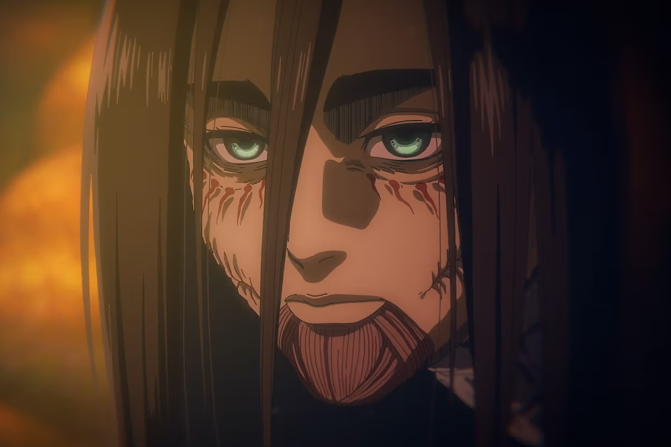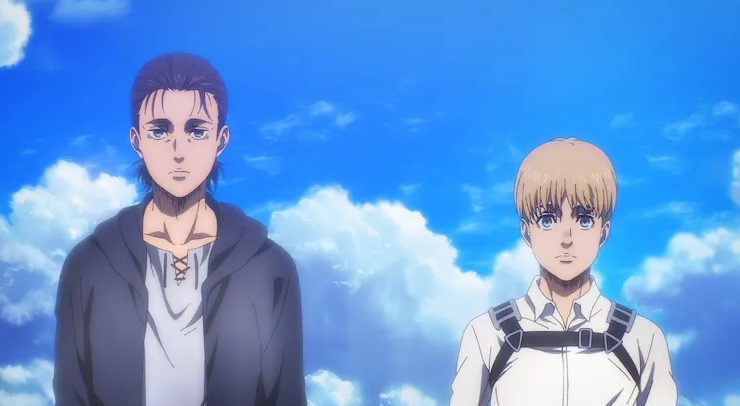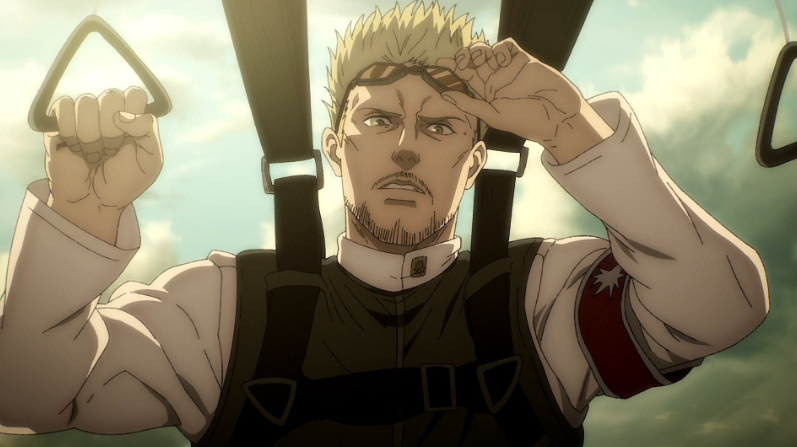Brain Dump of the Attack on Titan Anime Finale
See you later, Eren
So I watched the finale of the final chapters of the final part of the final season of Attack on Titan and was pleasantly surprised by the production and overall result of this iconic and controversial series. The first special aired at the start of the year and improved on certain parts of the manga that I disliked (mainly the execution of Hange’s sacrifice). So I was hoping for something similar this time. There were changes to this ending that I thought improved the source material, but these improvements also highlighted serious issues with Eren.
In this episode, the Paradis alliance makes their final attack on Eren’s rumbling as most of the world is crushed by his power. Everyone is forced to confirm their convictions to save the world over preserving Eren’s life. It is not a happy ending, but there are bittersweet conclusions to their individual arcs.
In the manga, Eren’s death unlocks memories that he had embedded in the minds of his friends as final parting words. We see Eren and Armin’s conversation, where they discuss his relationship with Mikasa, his reasoning for the genocide, the history of Founder Ymir, and the powers of the Attack Titan. The ideas explored are all half-formed, and after Eren confirms he slaughters 80 per cent of the world’s population for the sake of his friends, and that his behaviour during the entire final arc was some big mastermind plan to make the survey corps heroes, Armin consoles and thanks him.
Armin’s gratitude was a very uncomfortable piece of dialogue, and it is removed in the anime special. Instead of gratitude, he expresses disdain and horror, before suggesting that he is partly to blame for putting the ideas of freedom in Eren’s head in the first place. He then tells Eren that they will meet in hell. The rest of the conversation reiterates several personal issues I have with Eren’s motivations.
As fantasy/action shonen protagonists go, Eren holds a distinct presence in his story. When I think about some of the popular fantasy shonen that’s been released over the past 10 years, I can point to exact moments when the protagonist has taken a backseat in the story, or when the stories and motivations of the wider ensemble have simply appeared more interesting. The biggest victim of this style of writing is Yuji from Jujitsu Kaisen, who is regularly eclipsed by the charismatic Gojo, or whose arc and motivations simply pale in comparison to the more thoughtful character studies of Geto, Megumi, Nanami, and even Mahito.
By contrast, Eren dominates Attack on Titan. Every major plot event reacts to his motivations. His mantra of “just moving forward” is an overwhelming force that runs through the story. And this is impressive that with such characters as the wild and erratic Hange, Humanity’s Strongest Soldier Levi, the complex genius that is Erwin Smith, and the cool prodigy Mikasa, that Eren still manages to control the narrative. In Eren, Isayama created a monster that refuses to be dimmed by others.
Eren’s actions constantly change the direction of the story and impacts other characters, from influencing Jean’s empathy to softening Annie’s hard exterior; motivating his fellow trainees to join the survey corps, being the central cog in the plans of Erwin Smith, and forcing the hand of the global offensive against Paradis by allying with Zeke. Finally, Eren’s position as the final Attack Titan directly influences his predecessors, and as we see in Grisha’s flashback, Future Eren pushed his father to kill the Reiss family. He is the first person to offer freedom to Founder Ymir, thus triggering the rumbling and destroying the world. During his conversation with Armin, Eren says he directed Titan Dina towards his own mother. So the entire reason for Eren wanting to join the survey corps in the first place was because of something arranged by his future self. He created his own story.
Levi’s final salute. Just give him everything. EVERYTHING.
With this in mind, it is imperative that his final words are coherent and convincing. It makes no sense for a character of such influence to have ambiguous and vague reasonings right at the end. Granted, I dislike Eren just as a personality type. He’s the self-centred Boy Wonder who does everything according to his own will regardless of how it affects his loved ones, but I appreciate his role in the story and how his behaviour causes others to react. He’s got the plot in a virtual chokehold and drags it towards the conclusion. But his hold must remain firm, otherwise we get the convoluted dialogue in this key scene.
I’ve decided to roughly list the four main motivations that emerged from the finale. There are several secondary ones, but these are the points that stood out to me the most.
1. Ymir/Attack Titan confusion
Eren tells Armin that his head is all messed up thanks to his titan powers. The Attack Titan’s ability means the past, present, and future are all unfurling simultaneously, and so he’s often unsure of what he’s doing or why, and how much of it is the will of Founder Ymir.
2. Making the survey corps heroes
Ultimately, Eren wants to preserve the lives of his friends over everyone else’s, and in order for them to have long lives, he played the role of the villain on purpose, pushing them away and doing the rumbling so that they would stop him and save the world.
3. Fate
He is a slave to freedom unable to change the future and so all his actions are pre-determined for him.
4. Idiocy (!)
An anime only addition. Eren admits that the lure of unparalleled power drove him vengeful and angry and so he went with his emotions and flattened the world. He’s just an idiot with too much power, he says.
So obviously, the main issue with all of these motivations is that they can’t all meaningfully exist at the same time, and having them thrown at the viewer all at once is jarring. They contradict each other in significant ways.
If Eren is so confused and interconnected with the will of Founder Ymir then he cannot also have the autonomy to plot a massive performance of villainy.
If he is being pushed along by fate then he is too restricted to have such complex motivations and plans for his friends’ subsequent heroic actions.
If he did all this for his friends to have long lives, then he cannot also be a power-hungry idiot bent on destroying the world.
His behaviour throughout the final arc attests to his cold villainy: Sasha and Hange died and the others were put in life-threatening and emotionally scarring incidents all because of his actions. It implies he had unsheathed himself of the Boy Wonder persona and chose to let the world burn instead. But somehow, the reader is supposed to believe his destructive actions were a means to create long, happy lives for his friends? How? How can his friends rest knowing their happiness was worth the lives of 80 per cent of the world’s population? Who told Eren they wanted to be heroes? Why did Eren decide their futures for them, thrusting them into the roles of unwitting diplomats and peace envoys? How can he be motivated by their happiness and also be an idiot with too much power, actively putting them in constant danger? None of this makes sense.
Also big up Reiner. Brilliantly written character who also carried the final few chapters.
And so, the response from anime onlies has been interesting to watch. Of course it’s without the white hot vitriol that flooded online spaces when the final chapter came out, but the general vibe has been “I liked the ending. Eren’s reasons are a little confusing. But overall it’s a decent and heartbreaking finish”. For such an iconic series, it is a mild acceptance, nothing groundbreaking or earth shattering. The incoherence of Eren’s behaviour is clear, but these pitfalls are countered by the OST, the action, the emotion, and the overall story that has been a constant for so many of us for 13 years.
At the end of his story, Eren has to be carried by his ensemble cast to the finishing line. For the first time in the narrative, he slips into background noise. Levi and Mikasa are the stars of the show, Reiner’s resilience is notably admirable, Pieck’s unexpected prowess and Annie’s return and even Falco’s bravery bolsters the final chapters more than the protagonist. It’s notable that throughout the fight, Eren remains silent, and only makes his full appearance when he is being killed. Unfortunately, when it mattered the most, he had nothing of worth to say.



